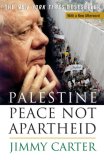Summary | Excerpt | Reviews | Beyond the Book | Read-Alikes | Genres & Themes | Author Bio

Peace Not Apartheid
by Jimmy CarterThis article relates to Palestine
A Short History of Palestine
![]() This article relates to Palestine.
It first ran in the October 4, 2007
issue of BookBrowse Recommends.
This article relates to Palestine.
It first ran in the October 4, 2007
issue of BookBrowse Recommends.






Your guide toexceptional books
BookBrowse seeks out and recommends the best in contemporary fiction and nonfiction—books that not only engage and entertain but also deepen our understanding of ourselves and the world around us.